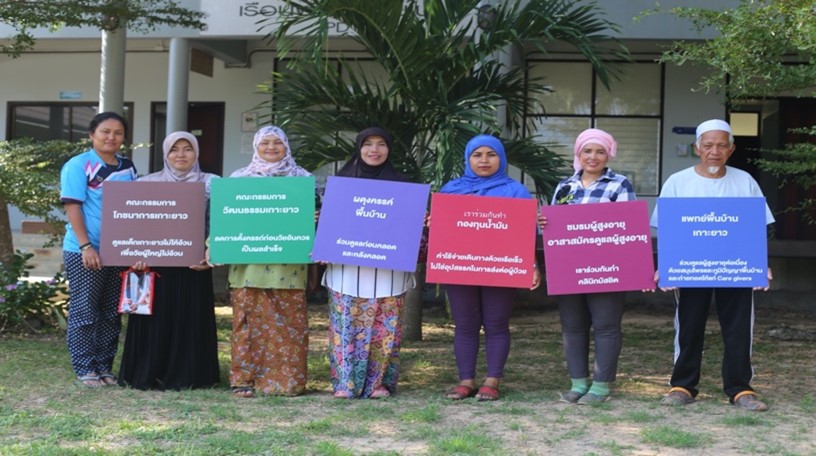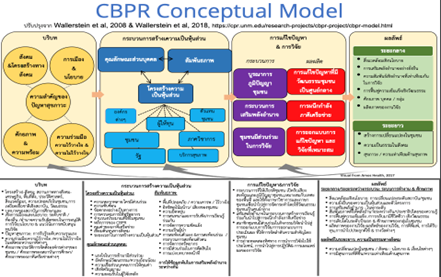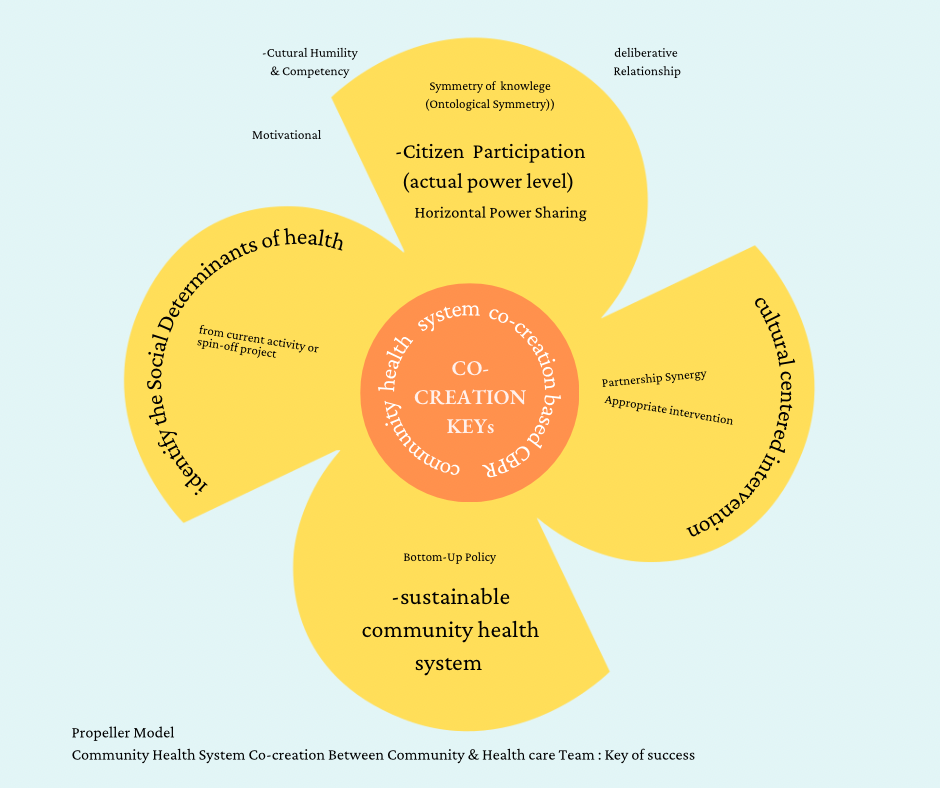Koh Yao Yai is an island located in the Andaman Sea, Thailand, with a population of 10,000 people, mostly Muslims. The health of the island is taken care of by a Multidisciplinary Team based at the newly built Prunai Hospital, a small community hospital that has recently been established by upgrading the structure of the Sub-district Primary Care Unit to provide better healthcare services to the islanders.

To develop the community health system, the approach of Community Based Participatory Research (CBPR) is used, which involves co-creating the health system through mutual learning and continuous collaboration. The Koh Yao Yai Family Clinic is part of this approach and aims to improve the health and well-being of the island community.
Successful community health system development projects: Dr. Marut used the original 2008 CBPR Model to evaluate projects on the Co-design of the Hospital in 2010; and Fuel SHARE in 2011; and to plan for the 2017 Mosque Clinic Project. He then consulted with his health team and community team of villagers, leaders, and volunteers in each project to refine the 2018 model (see links to English and Thai CBPR Model versions below). Focus group findings identified cross factors for success demonstrated in the Propeller model below (see link).
Website: http://care.prunaihealth.com/cbpr/
The three projects are:
1) Co-Design for Inpatient Unit and Prunai Hospital design project in 2010
2) FuelSHARE fund project in 2011 -present.
3) Mosque clinic project in 2017 -present.
1) Co-Design for Inpatient Unit and Prunai Hospital design project: Co-researchers: 1. Prunai Hospital Health Team; 2. Architectural Team composed of members from the community of architects and educational institutions; 3. Community Team (leaders and agencies) of community representatives from Ban Prunai sub-district, Koh Yao district.
Background: There has only been one doctor (Marut Lekphet, MD) who has been continuously serving the community of the Prunai Primary Care Unit. The community wanted to build an inpatient unit, but there was no appropriate architectural model for a small hospital that could cater to the needs of the Muslim community with its unique culture and spirituality that required physical, social, and mental health care to be integrated. The Buddhist doctor, therefore, learned the wisdom and religious dimensions from the community and worked with the community to design the hospital, with the help of a network of architects who came together specifically to create a design with the community's participation. (Dr. Marut: kohyaopcc@gmail.com)
Outcome:
1. Inpatient ward and Prunai Hospital with a healing environment conducive to cultural and spiritual factors that support the overall health care of the indigenous people.
2. System change: the interprofessional team shifted their approach and policy to use CBPR as a tool to create community health systems.
3. It serves as a model for building hospitals with community participation for other hospitals in rural areas of Thailand.
2) FuelSHARE fund project: Co-Researchers: 1. Prunai Primary Health Care team; and 2. Community Leadership Team and Community Representatives of Prunai, Koh Yao District
Background: When patients have conditions beyond the capacity of Prunai Hospital, such as requiring emergency surgery or advanced technology treatments, it is necessary to transfer them to hospitals in Phuket Province. However, due to a lack of budget & cost of boat transfer, which is valued at 10,000 baht, some members of the community cannot afford to send patients, leading to health care disparities.
Outcome:
1. There was a gathering of ideas and collaboration to find a solution to the disparity problem.
2. A fund was created through annual family contributions of 200 baht and charity events, FuelShare Fund Committee was established.
3. Fuelshare fund can pay for the cost of emergency boat transfers for patients. Every patient has access to emergency medical services without being denied transfer from 2011 to the present.
3) Mosque clinic project: Co-researchers: 1. Health Care Team - Prunai Hospital; 2. Village Health Volunteer Team; 3. Religious Leadership
Background: As the elderly population in the community grows, there has been an increasing collaboration between the health team and the community team. Thus, the team aims to establish a health care system to care for the elderly in the community. The goal of the collaborative process is to achieve the objective of providing happiness and spiritual well-being to the elderly by connecting physical and mental health with Spirituality with the practice of caring for them.
Outcome:
1. A program was created to promote, prevent, treat, and restore the health of elderly Muslims, led by a team of healthcare professionals, religious leaders, and volunteers, rotating to every mosque on Fridays to provide more accessible services to the elderly.
2. Tools were developed to assess “physical discomfort during Muslim prayer” and the “Kohyao spiritual well-being questionnaire”.
3. “Dua Text” was provided by the priest for promoting mental health and cognitive function for the elderly as well as religious study for the elderly. The elderly have experienced a decrease in physical discomfort and an improvement in their ability to perform daily activities especially to perform muslim prayer, as well as an increase in spiritual well-being. 4. Accessibility to elderly care has been improved.
Lessons Learned: Keys of success for community health system co-creation; demonstrated by Propeller Model (Marut Lekphet, 2023)

Link to Prunai, Koh Yao Yai, Thailand, CBPR Model in Thai Language:
http://care.prunaihealth.com/wp-content/uploads/2023/03/CBPR-THAI-HIRES.pdf
Link to Prunai, Koh Yao Yai, Thailand, CBPR Model in English:
Link to Propeller Model:
Link to Flyer on Community Health System Co-Creation Based CBPR: